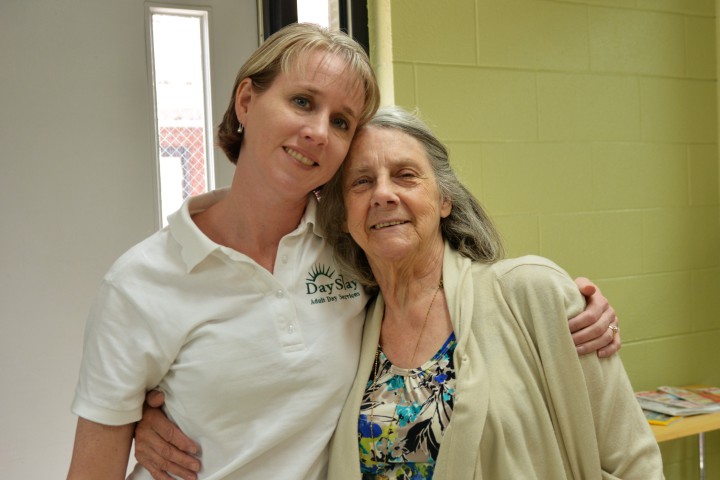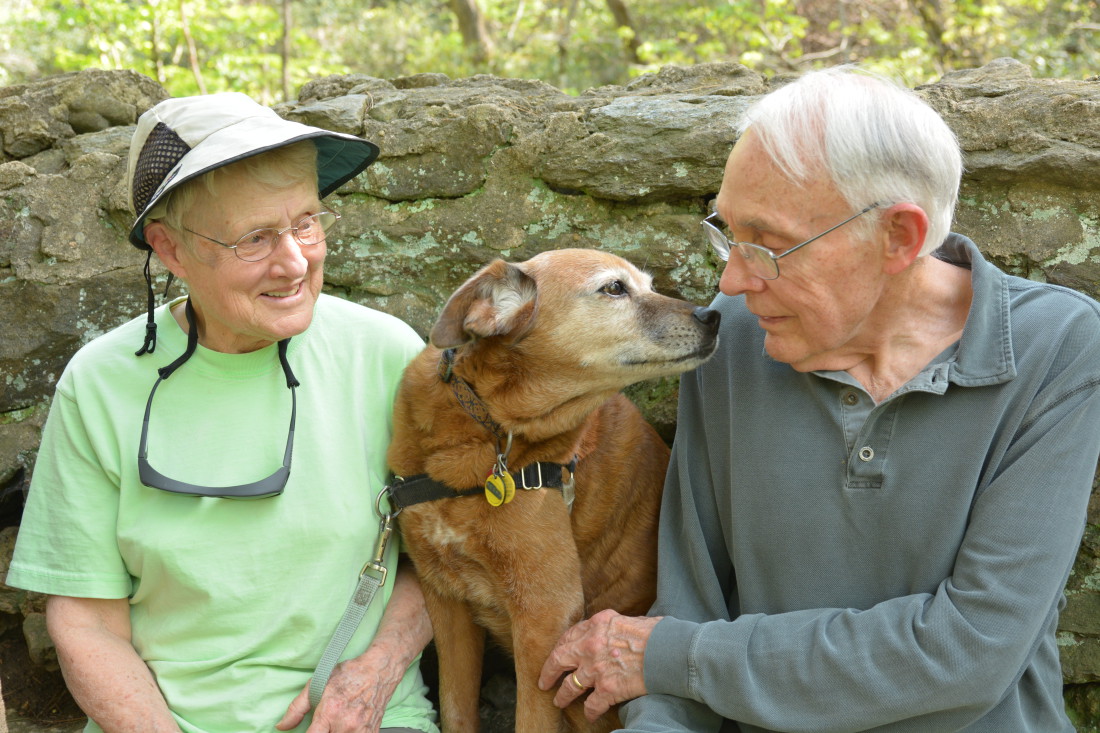Ann Mojonnier was traveling in Turkey when she liked the way a wine glass fit in her hand and asked the restaurant owner to sell it to her. Instead, he wrapped up six of them and gave them to her.
“I have a glass of wine with dinner every night,” says Mojonnier, who’s 81, holding the glass up to the light in her kitchen. Traveling is just one of the ways she and her husband, Al, 83, stay engaged. They’re planning to visit the Galapagos Islands in June.
“We bought these suits for the trip,” she says, holding up a full-body swimsuit she plans to wear while snorkeling. “We’re going to stuff our 80-year-old bodies into these, and we have bright yellow socks to go with them.”
“You’ve heard of blue-footed boobies?” asks Al.
“Well, we’re yellow-footed boobies,” says Ann, finishing the joke. They both laugh at the line they’ve probably told each other at least a dozen times.
By just about any measure, they’ve aged successfully so far.
Every afternoon, the couple walk with their dog, Mocha, often on the trails at Warren Wilson College. In the mornings, Al swims and Ann does yoga or Feldenkrais exercises. On Tuesdays, they volunteer at MANNA FoodBank — they call it their weight training, since it involves lifting food boxes. Through their church, they participate in a weekly meditation group and a monthly movie club. Ann also sings in the choir.
“I guess we’ve been successful,” she says. “We’re still active and we enjoy ourselves.”
They attribute their success, in part, to regular exercise and a diet that’s “a lot less brown, a lot more colorful than the meat and potatoes we ate when we were first married,” she explains. “A sense of humor is imperative, and a sense of curiosity is almost as important.”
“Flexibility,” Al chips in. “And not just physically.”
“Oh, and a sense of awe,” adds Ann.
How do you spell ‘happy’?
“The definition is elusive,” says Dr. Tim Plaut, a geriatric physician who practices at the Mountain Area Health Education Center. To him, though, successful aging means living life to the fullest, amid the inevitable challenges.
“I had a patient who lived to be 104,” says Plaut. “He was in a nursing home, but his nephew brought in a little moonshine for him every day. There were people to listen to his lifetime of stories. He was living successfully because he was happy: He was enjoying himself.”
Aging, and its “success,” can depend on the person. For one, successful aging might mean getting out and exercising every day; for another, being able to socialize despite physical frailty or even cognitive decline.
Candler resident Doris Scott says she felt useless spending her days at home with little human contact. But once the 74-year-old started going to DayStay Adult Day Services, she began to feel better about her life. “I like it here a lot,” she says. “I can talk to other people; I’m busy.”

Executive Director Rachel Miller says many people start out coming once a week and, before long, they’re there three, four or five days each week.
“Being among other people, keeping busy, socializing — all of it helps prevent deterioration,” notes Miller. “We see people become less depressed because they’re not isolated. We’ve had people able to stop taking antidepressants.”
Caregivers, she continues, may be reluctant to place their loved one in a day program, but both parties will most likely end up happier. “I just tell them they’re going to like their mom a whole lot more come dinnertime.”
And though these people may not be out hiking, they are more engaged, which makes for a better quality of life.
For those folks who can still get around on their own, the Osher Lifelong Learning Institute at UNC Asheville offers various classes and activities for seniors.
“Study after study shows how cognitive and physical decline are slowed by staying active and engaged — physically, intellectually and socially,” says Catherine Frank, executive director of OLLI in Asheville. “Use your body to keep your brain healthy, but you have to keep your brain engaged,” she stresses. “You can’t just do one: You have to do both.”
The program features peer-to-peer instruction in assorted subjects. Other groups focus on physical activities; recently, for example, Lori Postal and Lee Orowitz led a series of hikes.
Faye Morrison, 77, and her husband, Ben, 75, took the class to find new places to hike. Roger Munch, 69, says these outings help him resist the urge to just take it easy. “A body at rest tends to stay at rest,” he says. “I’d rather not let that happen.”
Finding a balance
But getting people to the best place they can be is complicated. It often means finding a balance of the right medications at the right dosages, says Tasha Woodall, MAHEC’s associate director of pharmacotherapy.
“It’s too easy to get into what we call a prescribing cascade — using one medication to treat the side effects of another,” she notes. And since few older people completely escape the need for medications, both Woodall and Plaut recommend reviewing all the meds someone is taking whenever a new symptom appears.
“Even herbal and other over-the-counter medicines can interact with each other or with prescriptions,” Plaut explains. “Your Parkinson’s symptoms might really be a reaction to medication. I’ve seen people misdiagnosed.”
Because the aging process typically involves losing muscle mass and gaining fatty tissue, it can change the way the body metabolizes medicines. Older patients’ brains and central nervous systems are also more vulnerable to the effects of drugs.
To try to determine why some folks age better than others, numerous longitudinal studies have followed people from birth or young adulthood through old age. Since 1986, the Nun Study (healthstudies.umn.edu/nunstudy) has tracked 678 American members of the School Sisters of Notre Dame who ranged in age from 75 to 102 when the project began. Funded by the National Institute on Aging, the study has found that even women whose autopsies showed evidence of Alzheimer’s disease in their brains functioned well at the end of their lives because they stayed intellectually and socially engaged.
Common ground
Areas of the world where people live long and healthy lives — often 100 years or more — all have certain things in common, notes Plaut. “People live in community. They stay engaged. They also eat well.”
According to the Blue Zones Project (bluezonesproject.com), all of these pockets of unusual longevity offer residents ways to keep moving naturally, healthy foods, activities that include people of all ages, a sense of community and a sense of purpose.
For example, a blue zone might have walking trails with exercise stations designed for older people. It might feature abundant farm stands or tailgate markets, opportunities for older people to volunteer in schools or after-school programs, and a public transportation system that’s accessible and convenient for seniors.
When people have access to all these things, they tend to live longer and remain healthy longer into old age.
That’s partly because activity and engagement can slow down many of the negative effects of aging, says Dr. Jeff Heck, a geriatric physician. “One thing that’s somewhat unique about Asheville,” notes Heck, who serves as MAHEC’s president and CEO, “is the number of activities available to older people.”
Exercise is the best medicine
Geriatric health care is critical, he explains, because older folks have age-specific needs.
“I find overtreatment is a really, really big problem,” says Heck. “Older people have often been excluded from medical studies because they have more than one chronic condition or just because they’re over 65. Well, you can’t learn about a group of people if you don’t include them in studies.”
So, what does Heck advise for staying healthy into old age?
“There isn’t a pill I can give you that’s better than exercise,” he says. “Drug results don’t even get close to the benefits of exercise.”
Walking improves balance and cognitive function. Reading, knitting and social engagement also help keep the brain healthy. And one recent study found that interval training — bursts of intense exercise followed by brief periods of rest — actually improved muscle health at the cellular level, although all forms of exercise improved overall health and fitness.
Researchers at the Mayo Clinic studied 72 healthy but sedentary adults who were under age 30 or over age 64. They were broken into four groups: One did weight training, another did interval training on stationary bicycles, the third did moderate training on stationary bikes for 30 minutes, and the control group didn’t exercise. The greatest gains in strength came in the weight training group, and both stationary bicycle groups showed improvements in endurance.
But the interval training group had changes at the cellular level that improved their bodies’ ability to process glucose and their cells’ ability to produce energy. The effect was more pronounced in the older subjects.
Increasingly, institutions that work with older people are encouraging exercise. Two local retirement communities — Deerfield and Givens Estates — have gyms, and residents are encouraged to make use of them. Many Medicare supplement insurance plans also pay for gym memberships or exercise classes.
The Mojonniers belong to Silver Sneakers at the Asheville YWCA, where they can attend free water aerobics and other classes. “We get up and move,” says Ann. “I think if I sat in a chair I would just shrivel up.”



Before you comment
The comments section is here to provide a platform for civil dialogue on the issues we face together as a local community. Xpress is committed to offering this platform for all voices, but when the tone of the discussion gets nasty or strays off topic, we believe many people choose not to participate. Xpress editors are determined to moderate comments to ensure a constructive interchange is maintained. All comments judged not to be in keeping with the spirit of civil discourse will be removed and repeat violators will be banned. See here for our terms of service. Thank you for being part of this effort to promote respectful discussion.